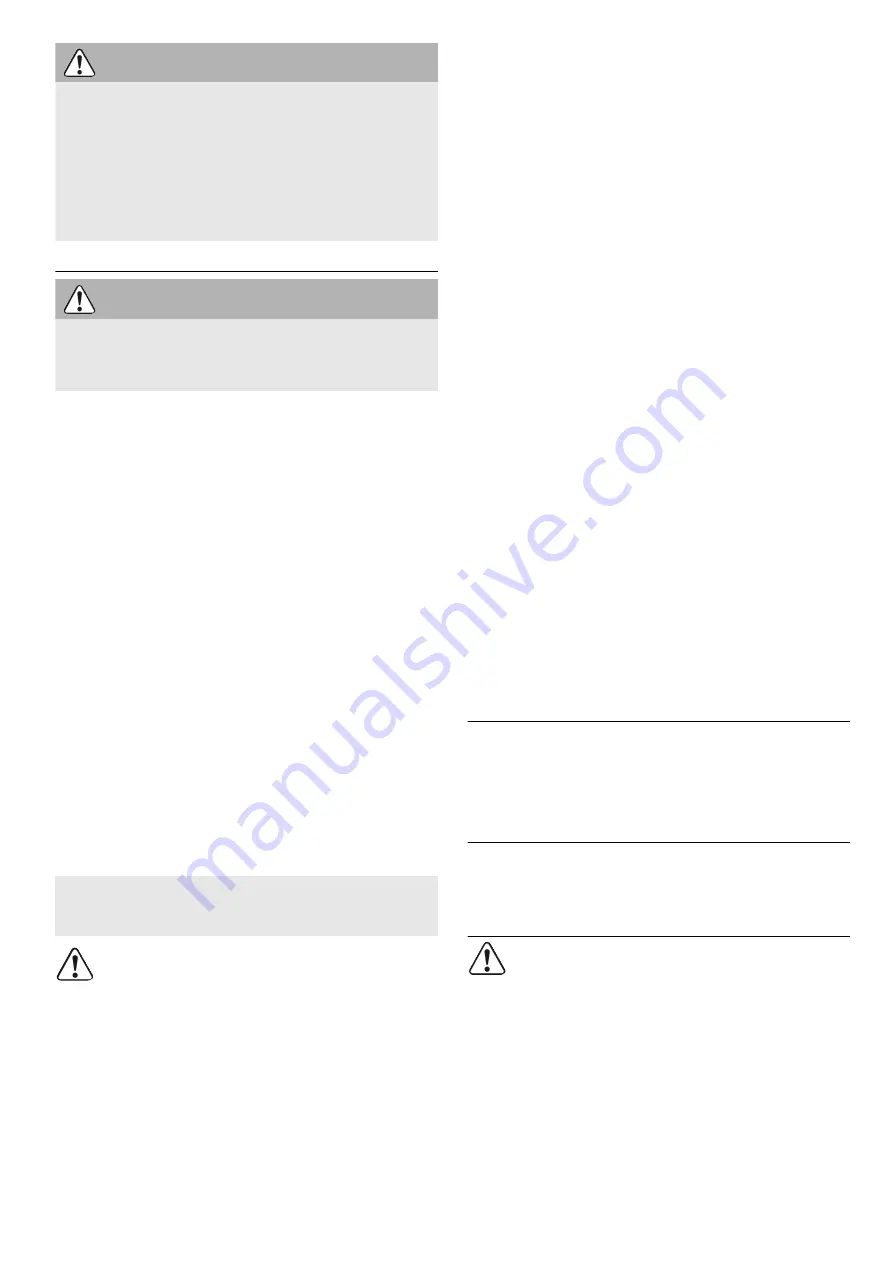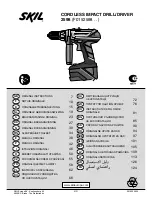
WARNING
Risk of injury
If a clamping flange is loose, the cutting
edges of the saw blade may break off, and if
a screw is loose, the saw blade may become
detached.
► Whenever you replace a saw blade, always
check that it is securely in place.
7.7
Dust extraction
WARNING
Heath hazard posed by dust
► Always work with an extractor.
► Comply with national regulations.
Festool mobile dust extractor
A Festool mobile dust extractor with a suction
hose diameter of 27/32
mm or 36
mm (36 mm
recommended due to the reduced risk of clog
ging) can be connected to the extractor connec
tor [6-1].
The adapter on a 27 diameter suction hose is
inserted into the angle adapter . The adapter on
a 36 diameter suction hose is inserted over the
angle adapter .
CAUTION! A static charge may build up if no
antistatic suction hose is used. The user may
receive an electric shock and the power tool's
electronics may be damaged.
Independent extraction
► Secure the connection piece [6-2] of the
dust collection bag [6-3] at the extractor
connector [6-1] with a clockwise rotation.
► To empty, remove the connection piece of
the dust collection bag from the extractor
connector with an anti-clockwise rotation.
8
Working with the electric
power tool
When working on the machine, observe
all of the safety warnings that are listed
at the start as well as the following rules:
–
Only guide the power tool towards the
workpiece when it is switched on.
–
Before each use, check that the pendulum
guard is working correctly using the re
tractor lever [1-4]. Ensure that the pendu
lum guard can move freely and does not
come into contact with the saw blade or
other parts at any cutting angle or depth.
Only use this power tool when it is in per
fect working order.
–
Always secure the workpiece in such a way
that it cannot move during machining.
–
Make sure that the extractor hose does not
snag the entire saw cut, either on the work
piece, the workpiece support or hazards on
the ground.
–
When working, always hold the power tool
with both hands on the handles [1-1]. This
is a prerequisite for precise work and is es
sential for plunge-cutting. Plunge into the
workpiece slowly and evenly.
–
Always push the saw forwards [8-9], and
never towards yourself.
–
Adapt the infeed speed to prevent the cut
ters on the saw blade from overheating and
prevent plastic materials from melting dur
ing cutting. The harder the material to be
sawn, the lower the feed speed needs to be.
–
Make sure that the rotary knob [1-12] is
tightened before starting work.
–
Do not work with the machine if the elec
tronics are defective, because this may lead
to excessive speeds. You can tell if the
electronics are defective if there is no
smooth start-up or if it is not possible to
regulate the speed or where smoke is
present or if there is a smell of burning
coming from the machine.
8.1
Sawing along the scribe mark
The cut indicators display the cutting sequence
without a guide rail:
0° cuts: [7-1]
45° cuts: [7-2]
8.2
Cutting sections
Position the saw with the front part of the saw
table on the workpiece, switch on saw and push
forward in cutting direction.
8.3
Sawing cut-outs (plunge cuts)
In order to avoid kickbacks, the following
instructions must always be followed when
plunge cutting:
–
Always position saw with the rear edge of
the saw table against a fixed stop.
–
When working with the guide rail, place the
saw against the kickback stop FS-RSP (ac
cessories) clamped to the guide rail.
English
25
Содержание HK 55 EBQ
Страница 2: ...1 1 1 10 1 12 1 11 1 13 1 15 1 16 1 14 1 9 1 8 1 7 1 1 1 2 1 3 1 4 1 6 1 5 1 ...
Страница 3: ...2 3 FS 3 1 ...
Страница 4: ...4 0 50 0 50 5 5 6 4 1 4 2 5 1 5 2 5 4 5 5 5 3 5 8 5 7 5 10 5 9 5 11 ...
Страница 5: ...7 45 0 6 1 2 6 1 6 2 6 3 7 1 7 2 ...
Страница 6: ...8 3 8 1 8 2 8 8 4 FS 8 7 8 5 8 6 8 9 8 8 ...
Страница 8: ......
















































